I am a big fan of historical films like Spartacus, Schindler’s List, Invictus, and Mississippi Burning. And I fully appreciate the artistic license screenwriters and directors take in each case for dramatic effect.
But I’ve always been concerned about artists taking so much license that what appears on screen bears little resemblance to historical facts. This concern is more acute than ever now that films provide the only “education” many young people get about major historical events. For example, most teenagers probably learned more about the institution of slavery from watching 12 Years a Slave than from reading history textbooks….
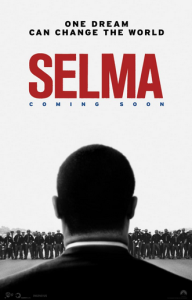 This brings me to Selma. It dramatizes the events surrounding the civil rights marches that led to passage of the Voting Rights Act of 1965. The historical facts are (or should be) well known to any student who had just one semester of American history in high school. What’s more, these (uncontroverted) facts are replete with so much drama, it would seem gratuitous, if not presumptuous, for a screenwriter to use creative license to revise them in any material respect.
This brings me to Selma. It dramatizes the events surrounding the civil rights marches that led to passage of the Voting Rights Act of 1965. The historical facts are (or should be) well known to any student who had just one semester of American history in high school. What’s more, these (uncontroverted) facts are replete with so much drama, it would seem gratuitous, if not presumptuous, for a screenwriter to use creative license to revise them in any material respect.
Yet, reports are that Selma is replete with so many historical revisions, it could win an Oscar nomination this year for best original screenplay:
[T]he film Selma falsely depicts Johnson as being both opposed to the historic civil rights march and initially against the Voting Rights Act.
‘Contrary to the portrait painted by Selma, Lyndon Johnson and Martin Luther King Jr. were partners in this effort,’ [an aide to LBJ] Mr. Califano wrote. ‘Johnson was enthusiastic about voting rights and the president urged King to find a place like Selma and lead a major demonstration.’
(New York Times, December 30, 2014)
No doubt Selma Director Ava DuVernay thought her revisionist version of the relationship between LBJ and MLK, during this pivotal point in the Civil Rights Movement, would pack a more dramatic punch. Only this explains her clear, formulaic intent to portray LBJ as a Pharaoh-like villain and MLK as a Moses-like savior.
No matter the commercial or political agenda, however, no artist should get away with peddling revisionist history as historical fact.
To say nothing of how this portrayal of Johnson feeds into the false and misguided narrative about White political and law-enforcement officials having no greater regard for Black lives, let alone civil rights, today than they had 50 years ago. (More on this angle below.)
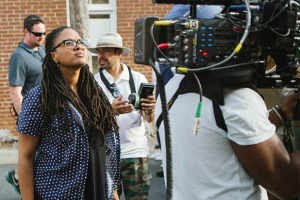 As it happens, the license DuVernay takes is all the more flagrant given the availability of a now-famous audiotape from January 15, 1965. For it has LBJ and MLK discussing the Selma marches as a political tactic to garner popular and congressional support for the Voting Rights Act.
As it happens, the license DuVernay takes is all the more flagrant given the availability of a now-famous audiotape from January 15, 1965. For it has LBJ and MLK discussing the Selma marches as a political tactic to garner popular and congressional support for the Voting Rights Act.
I have listened to it many times, and their exchange makes clear that, far from the adversaries Selma depicts, these men were collaborators, if not co-conspirators.
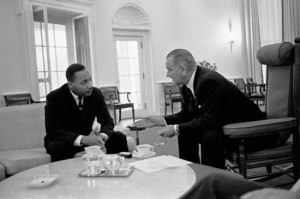 Indeed, such was LBJ’s enthusiasm for the voting rights of Black folks that he spends most of his time explaining to MLK how best to “stage” protest marches to evoke as much public sympathy and support as possible:
Indeed, such was LBJ’s enthusiasm for the voting rights of Black folks that he spends most of his time explaining to MLK how best to “stage” protest marches to evoke as much public sympathy and support as possible:
[I]f you can find the worst condition that you run into in Alabama, Mississippi, or Louisiana, or South Carolina, where – well, I think one of the worst I ever heard of is the president of the school at Tuskegee or the head of the government department there or something being denied the right to a cast a vote.
And if you just take that one illustration and get it on radio and get it on television and get it in the pulpits, get it in the meetings, get it every place you can, pretty soon the fellow that didn’t do anything but follow – drive a tractor, he’s say, ‘Well, that’s not right. That’s not fair.’
What’s more, such was MLK’s appreciation and understanding of LBJ’s good faith and bona fides – as a master not only of the art of political manipulation but also of the legislative process – that he spends most of his time conveying his unqualified agreement with everything LBJ says.
Accordingly, neither man could have been more pleased when the police turned the march from Selma to Montgomery, Alabama on March 7, 1965, into “Bloody Sunday” — the dramatic, soul-stirring images of which made headline news all across America.
But nothing betrays DuVernay’s depiction of this LBJ-MLK partnership quite like having Julian Bond, who was as much an aide to MLK as Califano was to LBJ, speaking out against it:
He did support King’s fight for voting rights. He probably is the best civil rights president America has ever had. The best. Absolute best. I think the movie people wanted Dr. King to have an antagonist. Why not have it be LBJ?
(CBS News, January 2, 2015)
Imagine that: “the best civil rights president America has ever had” – with all due respect to Barack Obama and the man Toni Morrison regretted hailing as America’s first Black president, Bill Clinton.
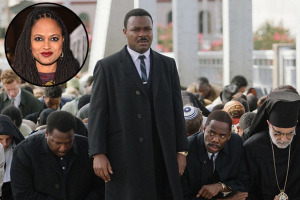 The point is that the difference between the LBJ depicted in this purportedly historical film and the one any student of history knows is, well, like black and white. Beauty might be in the eye of the beholder, but history should not be – even with allowances for reasonable variations in perspective and artistic license.
The point is that the difference between the LBJ depicted in this purportedly historical film and the one any student of history knows is, well, like black and white. Beauty might be in the eye of the beholder, but history should not be – even with allowances for reasonable variations in perspective and artistic license.
Just imagine a director making an historical film 50 years from now about passage of the Affordable Care Act (aka Obamacare), and depicting President Obama as doing more to block than pass it. She would have the artistic license to portray this revisionist version of history of course.
But she would be accused of such wanton distortions of historical facts that her film would (and should) be categorized as political propaganda, more in the genre of Birth of a Nation than that of Lincoln.
Unfortunately, far too many people (Black and White) will believe DuVernay’s version of “the Big Lie.” And, as people with “a little knowledge” are wont to do, they will think nothing of making plainly ignorant arguments based on the distortion of facts Selma presents.
I would not be the least bit surprised, for example, if some twit creates a viral meme by tweeting that:
#Magic Johnson has done more for civil rights than Lyndon Johnson – who was just another White Southerner doing all he could to preserve Jim Crow.
(145 characters, including spaces.)
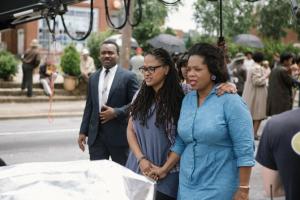 In fact, nothing indicates how likely this false portrayal of LBJ is to resonate quite like the Twitter spat that erupted last week between those in the vanguard of Selma-like marches against police brutality and Oprah Winfrey.
In fact, nothing indicates how likely this false portrayal of LBJ is to resonate quite like the Twitter spat that erupted last week between those in the vanguard of Selma-like marches against police brutality and Oprah Winfrey.
Oprah started it, innocently enough, when she suggested that these Michael Brown-inspired marchers need a leader to emulate MLK; specifically, one to work with establishment politicians (including the president) to help transform legal frustration into congressional legislation.
This, of course, is a perfectly sensibly suggestion; especially considering how little they’ve accomplished to date by arbitrarily ambushing businesses with their flash-mob “die-ins” and blocking traffic with their anarchic (i.e., non-permitted) street marches. Not to mention the looting, vandalism, and violence, including the open and notorious assassination of two NYPD officers, which have occasioned so many marches. Frankly, these tactics have people feeling more solidarity with, and sympathy for, the police than the purportedly aggrieved marchers.
Yet all Oprah got for her instructive, fact-based suggestion was #f**kOprah:
@brownblaze
Once again a Black ‘celebrity’ shows just how out of touch they are. So, while @oprah searches for an outdated leadership model, #weworkin.
3:45 PM – 2 Jan 2015
Mind you, those who took exception could have cited the hypocrisy inherent in Oprah advising these wannabe civil rights activists by citing the collaborative precedent LBJ and MLK set. After all, she’s starring in Selma, which makes a complete mockery of that historic collaboration.
In any event, for the reasons delineated above, I not only urge you to shun this movie, but hope the major arbiters of artistic merit, especially those at the Golden Globes and Academy of Motion Picture Arts and Sciences, snub it too.
Related commentaries:
Michael Brown, Eric Garner…